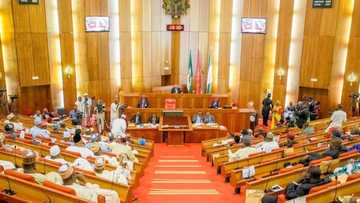APC Bars Political Appointees from Voting at National Convention, Gives Reason
- The ruling All Progressives Congress (APC) has taken a cautionary step ahead of its forthcoming convention
- The party on Thursday, March 24, announced that all political appointees will not be voting at the national convention
- According to the APC, the measure was taken as a result of the controversy surrounding Section 84 (12) of the Electoral Act, 2022 which bars political appointees from voting at convention
PAY ATTENTION: Click “See First” under the “Following” tab to see Legit.ng News on your Facebook News Feed!
FCT, Abuja - The All Progressives Congress (APC) has barred political appointees from voting at its national convention that is scheduled to hold on Saturday, March 26.
The ruling party made this known in a press statement on Thursday, March 24, sighted by Legit.ng on Twitter.

Source: Twitter
Legit.ng gathers that the political appointees are, however, allowed to attend the convention and serve as observers.
The statement reads:
PAY ATTENTION: Subscribe to Digital Talk newsletter to receive must-know business stories and succeed BIG!
“The National Caretaker Extraordinary Convention Planning Committee of APC has declared that all political appointees who were elected as delegates to the National Convention slated for 26/3/2022 SHALL NOT VOTE in view of the controversy surrounding Section 84 (12) of the Electoral Act,2022.
“However, political appointees can still attend as observers.”
The controversy around Section 84(12) of the Electoral Act
Section 84(10) of the Act specifically reads:
“No political appointee at any level shall be a voting delegate or be voted for at the Convention or Congress of any political party for the purpose of the nomination of candidates for any election”.
President Muhammadu Buhari made attempt to get the section out of the electoral act by sending an executive bill to that effect.
The president through the Electoral Act Amendment Bill asked the National Assembly to amend Section 84(10) of the Act to allow political appointees to contest and participate in the primaries without resigning.
However, the Senate rejected the bill sent by the president.
Section 84(12): Legal battle arises
Following the Senate's rejection of the bill, a lawyer and chieftain of the Action Alliance party, Nduka Edede, approached a Federal High Court sitting in Umuahia on the matter with the Attorney General of the Federation as the defendant.
The plaintiff asked the court to determine whether Section 84(12), when read together with Sections 66(1)(f) 107(1)(f)(137(1)(f) and 182(1)(f) of the 1999 Constitution, was not inconsistent.
The judgment, delivered by Justice Evelyn Anyadike, nullified Section 84(12) of the newly amended Electoral Act, saying it violated the provisions of the Constitution.
Anyadike held that the section was unconstitutional, invalid, illegal, null, void and of no effect whatsoever, saying it ought to have been struck out.
A few hours after the judgement was delivered, the Office of Attorney General and Minister of Justice announced the federal government’s plans to implement the court judgement allowing political appointees to run for office without resigning.
Senate to appeal ruling nullifying Section 84(12) of Electoral Act
Meanwhile, the Nigerian Senate on Wednesday, March 23, resolved to appeal the judgement of a Federal High Court sitting in Umuahia, the Abia state capital, annulling section 84(12) of the Electoral Act.
The resolution followed a motion titled: “Urgent need to appeal judgement of the Federal High Court Umuahia on suit no.: FHC/UM/CS/26/2022 on Section 84(12) of the Electoral Act, 2022.”
The motion was sponsored by Senator George Sekibo (Rivers East Senatorial District) and co-sponsored by 78 other lawmakers.
Source: Legit.ng




